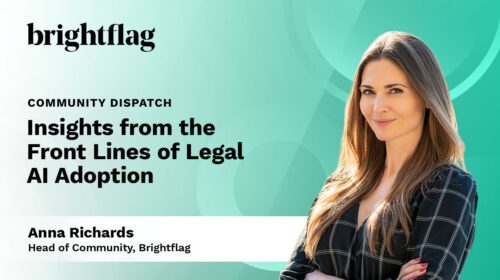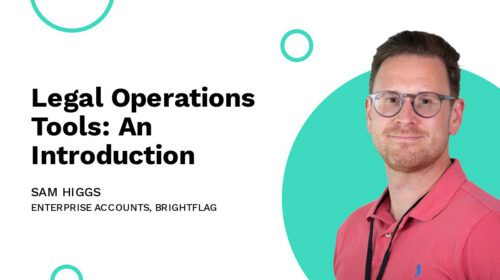The 6 Best Legal AI Tools for In-House Teams
Contrary to what the recent surge of attention surrounding artificial intelligence would have you believe, AI technology has been quietly working in the background of the tools you’ve been using every day for over a decade now—serving search recommendations on Google, making personalized viewing suggestions on your streaming platforms, and even assisting legal teams with invoice review.
But now, with the advent of generative AI tools like ChatGPT, the technology has been thrust back into the spotlight. And legal professionals that were previously slow to adopt AI are quickly realizing that they’ll have to secure AI solutions—and fast—if they don’t want to get left behind.
But with so much hype surrounding these tools, how can your in-house legal team sift through all the noise and find the legal AI tools that would serve them best? And what’s the easiest place to get started when it comes to AI?
Join us as we explore the different types of legal AI tools on offer today, and give some examples of products to try in each category.

General-purpose Generative AI Tools
General-purpose AI tools are a great place to start to get a feel for what generative AI can do for your in-house team.
In recent years, many companies have developed general-purpose AI chatbots that leverage large language models (LLMs) to answer questions and perform tasks for users through a conversational interface. You can experiment with one of the tools mentioned below to get a better understanding of their functionality.
These tools are not purpose-built for the legal industry, so you can test them out by asking just about anything, like giving you restaurant recommendations for your upcoming trip to New York. You can also ask them legal-specific questions, like providing a brief summary of the judicial appeals system in Germany, or an overview of recent case law in a particular legal practice area.
It’s important to know that many companies now have policies regarding the entry of sensitive or private data into general-purpose AI tools. Check your organization’s requirements before entering confidential information into these systems.
It’s also important to note that these systems are great for providing quick answers and broad overviews of topics where accuracy is not paramount. However, as they are not tailor-made for legal, where accuracy and reliability of data are so crucial, its best not to rely on them for accurate responses.
ChatGPT
OpenAI made waves when it released ChatGPT in late 2022. With hundreds of millions of users, it is one of the most widely used generative AI chatbots.
Users interact with ChatGPT by sending it text queries, known as prompts. Since ChatGPT is free to use, it can be useful for early experimentation with generative AI.
However, ChatGPT has been known to hallucinate, or generate false information, when it does not have an answer within its dataset. So, it’s important to verify information that comes from ChatGPT.
Microsoft Copilot
Microsoft Copilot is a generative AI chatbot built into the Microsoft Office suite. It can be used as a chatbot, like ChatGPT, to get answers to text-based queries. Copilot can also be integrated with other Microsoft applications like Word, Excel, and Outlook to provide in-context suggestions, like help with an Excel formula or improvements to the tone of an Outlook email.
Microsoft and Open AI have a partnership, which means that Copilot is built on the same large language models as ChatCPT.
Google Gemini
Similar to Microsoft Copilot, Google Gemini is a generative AI chatbot integrated with the Google suite of tools. It can be used in conjunction with YouTube, Google Maps, and Google Workspace.
In addition, if you live outside of the EU you may notice Gogoel Gemini increasingly showing up in your Google search results. Google leverages Gemini to provide quick summaries in response to common search queries.
Spend and Work Management AI Tools
In-house legal teams manage a large workload and a significant legal budget on behalf of their business. To effectively deliver legal services, they need to be able to effectively manage their spend and make the best use of their limited resources.
Enter AI. For a decade, AI has been helping in-house teams save time and control costs.
Machine learning models, supported by natural language processing can be used to read every line item across the thousands of law firm invoices legal teams receive each year. This data can then be used to automatically apply outside counsel guidelines, and to create an accurate and consistent data set for ongoing analysis and reporting.
In addition, generative AI has started to transform how in-house teams manage legal work and spend, enabling them to manage legal spend and matters using conversation instead of clicks.
Brightflag
Brightflag is an intuitive, AI-powered e-billing and matter management platform that helps in-house teams gain complete visibility into legal spend and control costs.
Brightflag has been using AI for over a decade to help in-house teams gain insight into their spending. Its machine learning model reads line item narratives on legal invoices, automatically applies outside counsel guidelines, and builds up an accurate and consistent data set for reporting.
More recently, Brightflag launched the first generative AI assistant for legal spend and matters. Ask Brightflag helps in-house teams gain insight into their legal work and spend in seconds, without the need to create a report. Its proprietary generative AI model, tailor-made for legal, understands legal data structures and ensures accuracy.
Legal Research AI tools
AI-driven legal research tools have received lots of attention since the dawn of the genAI era.
As a time-intensive, text-heavy process, legal research, and subsequent legal document drafting, are often seen as the types of work that are most prone to genAI disruption. Like research done by junior lawyers, however, it’s important to closely check the work done by legal research tools to ensure accuracy and comprehensiveness.
Harvey
One of the most buzzy generative AI legal startups, Harvey is designed to help law firms and large companies speed up legal research. Harvey is built on OpenAI’s models and therefore is built on the same foundation as ChatGPT. Harvey also supplements this data with case law and a law firm or organization’s proprietary work product.
Contract Management AI Tools
Contract management benefits from AI by helping in-house teams streamline the time-consuming tasks of contract review and drafting. Generative AI is being used by many Contract Lifecycle Management (CLM) providers to help reviewers draft more consistent contract clauses.
Ironclad
Ironclad’s Jurist AI legal assistant leverages generative AI to help in-house teams leverage automation throughout the contract drafting and review process. Users can ask Jurist questions like: ‘Identify any risks in this lease agreement, focussing on the indemnity and termination clauses’ and can ask it to update documents, like updating an offer letter so it can be used for a UK candidate.
Try an AI-Powered Legal Tech Tool for Yourself
Understanding the use cases for different AI tools is one thing, but there’s no substitute for actually taking the technology for a spin and seeing firsthand how it can take on legal tasks and change your department’s workflows.
As mentioned above, free general-purpose AI tools make it easy to run your own experiments in real-time. With ChatGPT, for example, it would only take a few minutes and a few prompts to gauge its utility across various practice areas and content formats.
Moving beyond free generative AI tools, many AI-backed legal software solutions are more than happy to provide legal teams with a hands-on look at their product.
Brightflag, for example, offers self-guided interactive demos of their platform. This allows you to experience firsthand what it would be like to apply Brightflag’s AI-backed tools to tasks like legal invoice review and matter management. You can give the interactive demo a try below:
Let’s Get Started
Congratulations. You’ve taken an important first step in your journey to understanding what legal AI tools are capable of—and finding the one that will return the most value for your in-house team.
If you’d like to learn how Brightflag’s modern, AI-powered e-billing and matter management platform can transform your legal operations check out our interactive product tour below, or schedule a personalized demo today.



